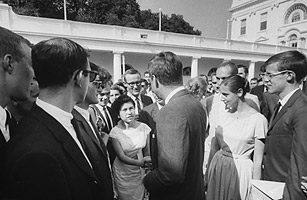
Perhaps it was the enthusiasm with which college students embraced the idea of the Peace Corps when then-candidate John F. Kennedy proposed the program that led his opponent, Richard Nixon, to vehemently critique it as a haven for draft dodgers. At the time, the Vietnam War was in full swing and conscription was a terrifying prospect for many men in their early twenties, so Nixon's criticism in part rang true. In fact, a recent survey of Peace Corp alumni who joined during draft years, found that almost one in five claimed avoiding the war influenced their decision to sign up. But serving in the Peace Corps was no guarantee against the draft. Many volunteers throughout the war were drafted, despite their commitment to the service organization. That was until 1967 when then-Peace Corps director, Jack Vaughn, began making a case against drafting volunteers on to the Presidential Appeals Board. In a statement at the time, he explained, "[t]he problem of induction notices to overseas volunteers is becoming a major concern for us. Pulling a volunteer off a productive job at mid-tour is unfair to the nation, to the host country, the Peace Corps and the individual."